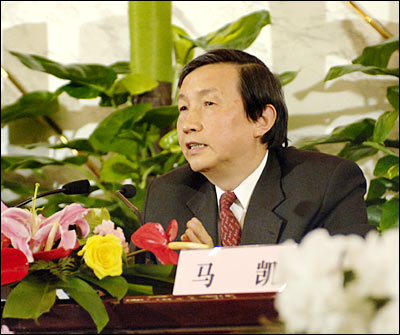| Tools: Save | Print | E-mail | Most Read |
| Key Points of the 11th Five-Year Guidelines |
| Adjust font size: |
At a press conference in Beijing on Monday, Ma Kai, minister of the National Development and Reform Commission (NDRC), highlighted some of the key points of interest of the 11th Five-Year Development Guidelines (2006-2010), which is now under discussion during the ongoing Fourth Plenary Session of the 10th National People's Congress (NPC). Minister Ma stressed that the Guidelines not only follow in the spirit of previous five-year plans, they have been developed in line with the current situation. The following are the key points raised by Ma.
The third chapter lists the indexes that relate to nine aspects of economic and social development, including two on economic growth, four on economic structure, eight on population, resources and environment issues, and eight on public services and standards of living. A total of 39 appreciable goals are included in the Guidelines, Ma added. He stressed that two of the indexes are termed "primary" and "representative." One is the index for GDP growth rate, which has a target of a 7.5 percent annual increase over the next five years. The second is the index on energy consumption and pollution control, which is set to reflect the investment in energy and environmental protection and how that relates to GDP growth. Ma emphasized that shortsighted interests should not be given priority over possible long-term damage. "The quality and efficiency of a countrys economic growth can only be judged by taking both output and reinvestment into account," he said.
(China.org.cn by Zhang Rui and Wang Zhiyong, March 7, 2006) |
| Tools: Save | Print | E-mail | Most Read |
 |
| Related Stories |
| Product Directory China Search |
Country Search Hot Buys |
